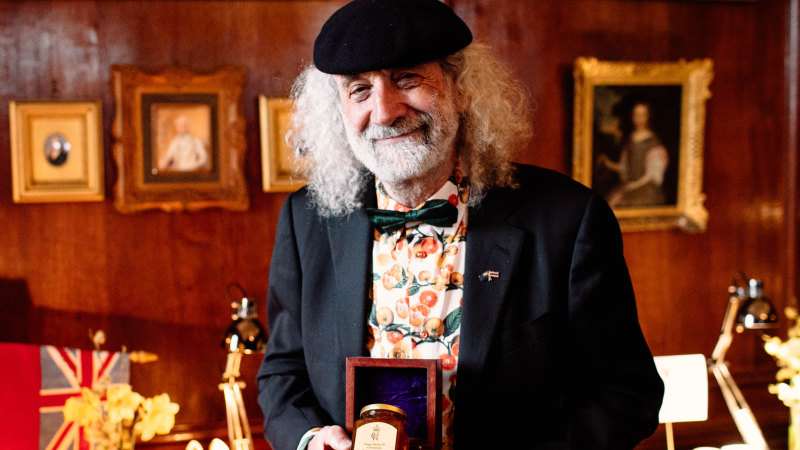Save articles for later
Add articles to your saved list and come back to them any time.
Dalemain, England: The perfect jar of marmalade, Reuben Kooperman says, shines like a jewel in the morning light.
“That to me is a very attractive thing. A great sensory pleasure,” he says, grinning from ear to ear and proudly wearing a new silk shirt emblazoned with Seville oranges that he picked up in Paris last week.
Australian Reuben Kooperman’s marmalade has been chosen from thousands of entries to be presented to King Charles III in honour of his coronation.Credit: Hermione McCosh
“You never quite know until the third day if you’ve actually cracked it or not because by then it’s cooled out, it’s set, you know whether it’s even, you know how clear it is. And you can really start to understand how to taste the flavour profile.”
Kooperman, who has emerged as one of Australia’s most decorated amateur marmalade-makers over the past decade, has good reason to smile. The 69-year-old’s latest batch is about to be given the regal treatment.
It was honoured at The Dalemain World Marmalade Festival at the weekend with a one-off prize: to be presented as a formal gift to King Charles III for his coronation. There were only two rules – firstly, it had to be organic, and secondly, contain no alcohol.
King Charles III will be given Perth marmalade for his coronation.Credit: Fairfax
“I really am thrilled,” he said. “When I got the phone call at home to tell me I’d won, they asked first whether I had a jar leftover, and secondly if I could make it? I mean, of course I could make it for this.”
Organisers of the weekend’s annual event in England’s Lake District received thousands of entries from more than 40 countries and territories, including Canada, Japan, Ukraine, Hong Kong, Argentina and Malta.
Categories include “Merry Marmalade”, for those who enjoy a streak of booze in their breakfast spread, “Children’s Marmalade”, “Gardener’s Marmalade” and “Man Made Marmalade”, introduced to encourage blokes to get in the kitchen. The overall winner’s recipe, which must be citrus-based, is used in a small commercial batch sold at Fortnum & Mason, a famed upmarket department store in Piccadilly, London.
Jane Hasell-McCosh, the owner of Dalemain, a Georgian mansion just outside Penrith in Cumbria, England, began the festival in 2005.She drew inspiration from one of the family’s ancestors, Elizabeth Rainbow, who made some of the earliest recorded marmalade at the Bishop’s palace outside Carlisle in the 1660s.
Makers descend on the now-annual festival from around the world, where an expert panel is a highlight and almost 100 enthusiasts cram into a room to ask cooks, judges and critics every possible thing you could imagine about marmalade.
A regular entrant to competitions, Kooperman has won five separate categories and 15 gold medals since 2010. He said making the trip to be at Dalemain was like being in “marmalade heaven”.
The judges rated his jar – made with Seville oranges “lovingly and organically grown” by his wife, Deborah, in their suburban Perth backyard – the perfect score of 20. The panel included a number of food experts, food writers and members of the Women’s Institute.
“Beautiful presentation and colour, perfect texture and set. Peel cooked, delicious flavour. Well done!” read the official judging card. The marmalade was presented in a handcrafted jarrah box, made by Kooperman’s pals at the local Perth Men’s Shed.
Kooperman said there are several secrets to his success: virtually all the marmalade he makes is made the day the fruit is picked; an absence of pectin; and a tried-and-tested traditional method for a small batch of about six jars.
The Dalemain World Marmalade Festival was held at the weekend in Cumbria, with a competition to find the best marmalade on the planet.Credit: Hermione McCosh
Kooperman – who works in construction, is a published wine critic, plays the drum in various swing, traditional Irish and Hawaiian bands, and is the longtime honorary Consul-General of Thailand to Perth – has been preserving for almost 40 years. He followed in the footsteps of his father who was a jam-maker but did not have a taste for marmalade.
“I like to eat marmalade, I pretty much eat it every day. It goes really well on, you know, beautiful sourdough bread with lovely high-quality butter and a Yunnan tea from the east of China,” he said.
British food scholar Ivan Day said marmalade-makers from the antipodes have one advantage over their counterparts in Britain.
“I think the reason we have seen so much good marmalades emerge from Australia or Argentina or Japan is that so many people can just pop down to the bottom of the garden,” he said.
Jane Harley, the award’s Australian ambassador – who will help organise a southern hemisphere festival in Birregurra, about 120 kilometres south-west of Melbourne, later this year – said the romance of marmalade was that oranges “always come from warm and sunny places”.
“And whether you are making marmalade in July in a cold Melbourne winter or [in the] tropical north, you are capturing sunshine in a jar,” she said.
Get a note directly from our foreign correspondents on what’s making headlines around the world. Sign up for the weekly What in the World newsletter here
Most Viewed in World
From our partners
Source: Read Full Article



